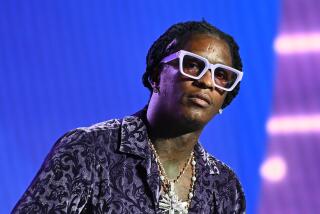Defense Motion to Remove Judge in Riot Case Rejected : Court: Lawyer for a suspect in Denny beating sets off heated debate. Another jurist rules that colleague is not biased.
- Share via
Lawyers for Damian Monroe (Football) Williams, who is charged with attacking motorists at the intersection of Florence and Normandie avenues during the opening hours of the Los Angeles riots, on Friday accused a Municipal Court judge of bias and demanded that he disqualify himself from the case.
That motion, which came on the first day of a highly charged preliminary hearing for Williams and two other defendants, was rejected--but not before delaying the proceedings for hours and involving defense lawyers in heated debate. Testimony began late Friday afternoon with a witness who videotaped some of the attacks, but said he felt pressured into signing a statement that helped prosecutors link Williams to beatings.
The hearing is expected to last well into next week. At its conclusion, Municipal Court Judge Larry P. Fidler will decide whether there is sufficient evidence to hold Williams, Antoine Eugene Miller and Henry Keith (Kiki) Watson for trial.
All three are charged with attempted murder, mayhem, torture and robbery in an attack on truck driver Reginald O. Denny, and also face a variety of lesser charges involving attacks on other motorists.
The hearing had been scheduled to begin early Friday, but was delayed when Williams was not put on the bus from jail to the courthouse, and then postponed again when his lawyers filed the motion demanding that Fidler remove himself from the case.
“We’ve looked at this case inside out, and we have determined that at the moment Judge Fidler is biased and prejudiced,” said Dennis Palmieri, Williams’ lead attorney. “I think it would be a tremendous abuse of discretion” if he did not recuse himself, Palmieri added.
The motion took prosecutors and lawyers for the other defendants by surprise. Several of the attorneys expressed amazement that Palmieri risked antagonizing the judge on the first day of the preliminary hearing.
“It was bull,” said James Gillen, who represents Miller. “There were no grounds. Fidler is one of the best judges on the bench.”
In a declaration, however, Palmieri said Fidler’s refusal to lower the bail for Williams and his unwillingness to delay the preliminary hearing showed the judge was prejudiced. In addition, he accused Fidler of meeting with prosecutors without properly allowing lawyers for Williams to attend.
As a result, Palmieri said, Williams “cannot have a fair and impartial hearing” as long as Fidler is presiding.
The hearing was delayed for several hours while the matter was referred to Municipal Court Judge Kathleen Kennedy-Powell. She issued a one-page order declaring that Fidler was not biased or prejudiced.
Only after the tussling over Palmieri’s motion was settled did the prosecution present its first witness, Timothy Allen Goldman, a South Los Angeles resident who with his brother and a third person made several videotapes of attacks at Florence and Normandie. Portions of them were shown in court Friday.
Speaking haltingly, his eyes often nearly closed in concentration, Goldman offered bits of testimony that each side said favored its case. Prosecutors introduced a statement that Goldman made to police in which he identified one assailant on his tapes as the same man who hit Denny with a brick--the person police say is Williams.
But when asked directly whether he could identify anyone from the tapes, Goldman said several times that he could not.
“There were so many people out there,” he said. “It’s kind of difficult to single out any individual.”
Goldman also said he felt pressured to make his statement because his brother had been arrested during a police and FBI search for the videotapes and allegedly looted liquor. Goldman said he feared that unless he cooperated, his brother might be sent to prison or his family harassed.
“He felt extremely intimidated,” Gillen said after the court session. “That’s very important to note.”
If defense lawyers can show that Goldman’s statement was made under duress, they might be able to prevent it from being used as evidence.
While those statements bolstered the defendants’ cases, however, Goldman also told the court that he had heard no racial slurs at Florence and Normandie, even though he was nearby when Denny drove his truck into the intersection.
That contradicts statements made by supporters of the defendants, who say that Denny provoked the beating by shouting slurs against African-Americans in general and Rodney G. King in particular.
More to Read
Sign up for Essential California
The most important California stories and recommendations in your inbox every morning.
You may occasionally receive promotional content from the Los Angeles Times.














